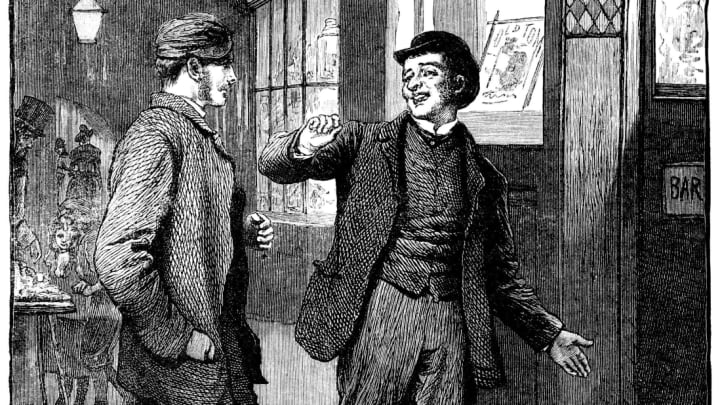Did you ever hear the one about the inn-experienced hotel employee? You’ll find it in Puniana, the most riotous collection of Victorian puns you could hope to read. “A large number of the puns, of course, present the usual anomaly of being good, because they are so bad,” reads one 1867 review of the book.
It’s a delightful read. “Joke books tended to be quite varied,” Dr. Bob Nicholson, Reader in History at Edge Hill University and an expert on Victorian humor, tells Mental Floss. “Puniana is just a relentlessly eccentric bombardment of puns that goes on for hundreds upon hundreds of pages.”
Nicholson points out that most of the puns in the collection come in the form of conundrums, jokes set up as riddles (like knock-knock jokes) that were popular at 19th-century parties. “To be in possession of a pun or a good conundrum, particularly one people hadn't heard, that's a good bit of conversational ammunition you can bring to a dinner party,” he says.
So, without further ado, here are 30 of Puniana’s hilarious—or hilariously bad—conundrum puns that might make you the best-guessed guest at your next bash.
1. What is the difference between a beehive and a diseased potato?
None at all; as one is a beeholder, the other a speck’d tatur.
2. What sort of musical instrument resembles a bad Continental hotel?
A vile-inn. [You wouldn’t like a foreign vile-inn very long; you must return to your Bass-soon!]
3. Why is a door always in the subjunctive mood?
Because it’s always wood (would)—or should be!
4. Why will seeing a schoolboy being thoroughly well switched bring to your lips the same exclamation as seeing a man lifting down half a pig, hanging from a hook?
Because he’s a pork-reacher (poor creature)!
5. Why is a four-quart jug like a lady’s side-saddle?
Because it holds a gall-on.
More Articles About The Victorian Era:
6. How is it you can never tell a lady’s real hysterics from her sham ones?
Because, in either case, it’s a feint.
7. What sort of tune do we all enjoy most?
For-tune, made up of bank-notes!
8. What is the best way to kill ants?
Hit your uncle’s wife on the head with a hammer!
9. What is the best way of making a coat last?
Make the trousers and waistcoat first.
10. Why are birds melancholy in the morning?
Because their little bills are all over dew!
11. When is the soup most likely to run out of the saucepan?
When there’s a leek in it.
12. When does a sculptor explode in strong convulsions?
When he makes faces and—and—busts!
13. Why is the isthmus of Suez like the first u in “cucumber?”
Because it’s between two seas.
14. When were there only two vowels?
In the days of No-a, before U and I were born!
15. If a tree were to break a window, what would the window say?
Tree-mend-us! [In allusion to its pane, of course.]
16. Why is a gardener dissipated?
Because he’s continually raking, and hoes a good deal!
17. Why is a piano like an onion?
Because it-smell-odious?
18. Why does a stingy German like mutton better than venison?
Because he prefers “zat vich is sheep to zat vich is deer!”
19. What is the difference between an honest and a dishonest laundress?
One irons your linen, the other steals it.
20. Why is a man who never lays a wager as bad as a regular gambler?
Because he’s no better.
21. Why is a baker a most improvident person?
Because he is continually selling that which he kneads himself!
22. Why is it easy to break into an old man’s house?
Because his gait is broken and his locks are few.
23. Where should you feel for the poor?
In your pocket, to be sure!
24. Why is a very pretty, well-made, fashionable girl like a thrifty housekeeper?
Because she makes a great bustle about a small waist.
25. Why should a candle-maker never be pitied?
Because all his works are wicked, and all his wicked works, when brought to light, are only made light of.
26. In what key should a declaration of love be made?
Be mine, ah (B minor)!
27. How do we know that the Queen approves of the penny postage?
Because she gives her countenance to it!
28. Why is the Prince of Wales, musing on his mother’s government, like a rainbow?
Because it’s the son’s reflection on a steady reign!
29. Why is it almost certain that Shakespeare was a broker?
Because no man has furnished so many stock quotations.
30. Why is a judge’s nose like the middle of the earth?
Because it’s the scenter of gravity.
